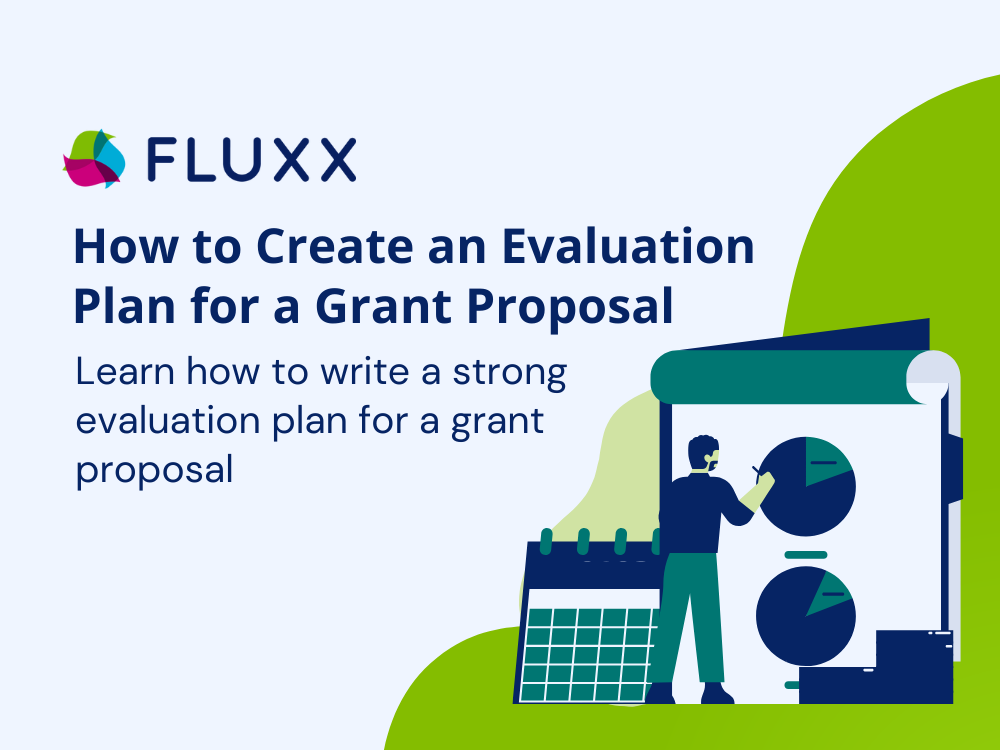What are the Differences Between Grant Administration and Grant Management
Learn how to create an evaluation plan for a grant proposal, see a grant proposal evaluation sample, and understand how tools like Fluxx help you...
Be the first to know about new Fluxx grants management resources, blog articles and podcasts.


Grant funding isn’t just about great ideas, it’s about impact. And to prove impact, you need more than intentions. You need a plan to measure what success looks like. That’s where a strong evaluation plan comes in. Whether you're applying for a government grant, foundation funding, or a corporate gift, funders want to know how you’ll measure results and how you’ll use that information to improve.
An evaluation plan is your opportunity to show that your nonprofit doesn’t just deliver programs, you deliver outcomes. But what makes a plan effective, and how do you build one that funders will trust?
In this blog, we cover what an evaluation plan is, how to create one for a grant proposal, and how grant management software like Fluxx helps you turn plans into actionable insights.
An evaluation plan is a detailed document that outlines how your nonprofit will measure the effectiveness of a grant-funded program. It typically accompanies your proposal and is reviewed by funders to assess how your organization defines success, monitors progress, and reports impact.
Think of it as the blueprint for how you'll assess your work. It’s not just about checking boxes, it's about providing evidence that your programs are working and your organization is a worthy investment.
Evaluation plans are used to:
Funders want to see that you take results seriously. A clear, concise evaluation plan signals that you’re organized, impact-driven, and prepared to deliver outcomes, not just outputs.
While evaluation plans vary slightly depending on the type of grant or funder requirements, most include the following key components:
Crafting an evaluation plan may feel overwhelming at first, but it becomes manageable when you follow a systematic approach:
Step 1: Start With the End in Mind
What does success look like for this grant-funded program? Begin by clearly defining your intended outcomes.
Step 2: Develop SMART Objectives
Your goals should be Specific, Measurable, Achievable, Relevant, and Time-bound. This will ensure your KPIs are easy to track.
Step 3: Choose Evaluation Methods
Select data collection tools and processes that are realistic for your team, appropriate for your audience, and rigorous enough to demonstrate impact.
Step 4: Identify Resources and Staff
Assign evaluation tasks to specific team members and make sure you allocate enough time and budget to do it well.
Step 5: Align with Funder Requirements
Each funder may have different expectations. Carefully review the RFP or funding guidelines to ensure your plan aligns with what they require.
Step 6: Draft the Plan and Integrate Feedback
Write your plan clearly and concisely, then solicit input from colleagues, program staff, and stakeholders. Revise as needed.
Before you ever propose, what funders need assurances of is that you know not only how to judge success, but that you can communicate what that process of judgment will look like. Writing out an example of what that will look like is one of the strongest ways you can demonstrate this. It makes it clear that you have put together a logical and achievable plan of action that you can then use to judge success.
Good evaluation samplers go beyond just communicating the KPIs and link the goals and metrics together and then methods and reporting. They give donors and funders insight into what you envision happening in turning data into insights and insights into action at the programs. Here is an easy and organized template that breaks down what an evaluation plan might look like in applying it for a grant:
Yes, evaluation plans should always be tailored to the specific grant you’re applying for. A government grant may require a more rigorous data and compliance structure, while a foundation grant may place greater emphasis on storytelling and community engagement.
That said, most evaluation plans can be adapted from a standard template and customized to meet specific funder priorities. A well-developed internal framework will make this adaptation faster and more effective across grant applications.
Keep in mind:
It absolutely is. The most successful nonprofits don’t just write evaluation plans, they operationalize them. That’s where grant management software comes into play. Grant management platforms like Fluxx make it easier to:
By integrating your evaluation plan directly into your grant management system, your team ensures that data isn't siloed or forgotten. Everything is tracked, organized, and accessible when needed which eliminates missed deadlines, duplicated work, or incomplete reports.
An evaluation plan isn’t just a funder requirement, it’s a strategic asset. When built thoughtfully and implemented consistently, it becomes your map for ensuring mission success and long-term funding sustainability.
From tracking outcomes to streamlining compliance, having the right plan and the right tools to execute it sets your organization apart. Whether you're new to grant proposals or managing dozens of awards, evaluation planning is essential for proving value and earning trust.
Ready to see how Fluxx can support every step of your grant lifecycle, including evaluation planning? Schedule a demo today.
Learn how to create an evaluation plan for a grant proposal, see a grant proposal evaluation sample, and understand how tools like Fluxx help you...
Given the opportunity, you can be an integral part of improving the entire grantmaking process, from evaluating proposals to assessing the impact of...
From application to ongoing learning and evaluation, mobile grants management software keeps program managers and grantees connected in more...
Be the first to know about new Fluxx grants management resources, blog articles and podcasts.